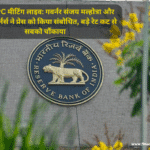In 2025, Secrets banks offer incredible services—from Online Banking and Mobile Banking to smart Fixed Deposits and instant payments through Net Banking. But behind all the modern tech and friendly customer service, there are a few things that banks often don’t tell you upfront. These are not illegal or shady, but they’re important to know if you want to save money, earn more interest, and avoid hidden charges.
So today, we’ll uncover the Top 5 Secrets Banks Don’t Want You to Know in 2025 — all in simple language. Whether you’re a student, working professional, or senior citizen, this article will help you become a smart banking customer.
🔍 Secret 1: You Might Be Earning Less Interest Than You Think
Banks love to advertise “up to 7% interest” on Fixed Deposits. But the reality? Most people don’t get that full 7%. Why?
- That high rate is usually only for specific tenures (like 444 days).
- It may apply only to deposits above ₹5 lakh or ₹10 lakh.
- Senior citizens may get higher rates, but others get much lower.
Also, banks don’t highlight the impact of inflation. If inflation is 6%, and your FD gives 6.5%, your real gain is only 0.5%. That’s hardly enough to grow your wealth.
Tip: Always compare FD rates on third-party platforms. Also consider options like post office schemes or mutual funds for better returns.
🔍 Secret 2: Online Banking & Mobile Banking Apps May Charge Hidden Fees
Most of us love Online Banking and Mobile Banking for their convenience. But did you know:
- Some banks charge for more than 5 IMPS/NEFT/RTGS transactions in a month.
- Requests for cheque books, statements, or card replacements through mobile apps may involve hidden service fees.
- Some apps promote credit card offers or loans, but accepting them blindly can increase your debt.
These charges are often not clearly shown on the app. secrets banks assume you won’t notice a ₹10 or ₹25 fee here and there, but over time, it adds up.
Tip: Read your bank’s “Schedule of Charges” carefully. It’s available on the bank website and shows all the fees for Mobile Banking, Net Banking, and other services.
🔍 Secret 3: Your Savings Account Might Be Draining Your Money
Think keeping money in a savings account is safe? Yes, but it’s not always the smartest financial move.
- Most savings accounts offer just 2.5% to 4% annual interest.
- At the same time, banks deduct money for not maintaining the minimum balance.
- There are also charges for using ATMs more than 3–5 times a month in metros.
The bank won’t call you and say, “Hey, you’re losing money keeping it idle.” But that’s exactly what’s happening.
Tip: Use Net Banking or Mobile Banking to set up automatic transfers. Move idle money into short-term FDs or liquid funds. You’ll earn better returns without much risk.
🔍 Secret 4: You Don’t Always Get the Best Loan or Credit Card Offers
If you’ve ever taken a loan or credit card, you know banks offer tons of schemes. But here’s the secret: the best offers aren’t always given to loyal customers.
Instead, banks reserve special interest rates and no annual fee cards for new customers. That means:
- You might be paying 14% interest on a personal loan while a new customer gets 11%.
- Your credit card has an ₹1,000 annual fee while a newer one with better features is free.
Why? Because banks spend money to attract new users — not to retain old ones.
Tip: Use Online Banking and Net Banking to regularly check current offers. Don’t hesitate to negotiate with the secrets banks or switch to a competitor. Loyalty doesn’t always pay in banking.
🔍 Secret 5: Banks Push Products That Benefit Them — Not You
Ever got a call from your bank recommending:
- Insurance policies?
- Investment plans?
- “Zero-risk” fixed-income products?
Chances are, these are bank-sponsored or partner products that offer high commission to the bank — not high returns to you. In fact:
- Some insurance-cum-investment products may lock your money for 5–10 years.
- Others may have high entry/exit charges.
The bank won’t tell you that you could earn better returns with a basic mutual fund or Public Provident Fund (PPF).
Tip: Before buying any financial product through your bank, do your own research. Use platforms that compare all investment options — not just what your secrets banks promotes.
✅ Final Thoughts: Be a Smart Banker in 2025
Banking in 2025 is fast, digital, and accessible. From Online Banking and Mobile Banking to advanced Net Banking portals, you have full control over your money. But that control only helps if you also have the right knowledge.

I am a digital marketing executive as well as content writer in the banking blogs. My goal is to provide simple, interesting and reliable information to readers through my articles so that they always stay updated with the world of banking.




Nếu bạn đang tìm một nhà cái uy tín, hãy thử 188V ! Với giấy phép PAGCOR, tỷ lệ hấp dẫn và khuyến mãi khủng mỗi ngày, đây là điểm đến không thể bỏ lỡ. TONY01-26